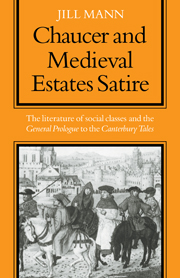Book contents
- Frontmatter
- Contents
- Preface
- List of Abbreviations
- Note on References
- 1 Introduction
- 2 The Anti-Clerical Tradition in Estates Satire
- 3 Estates Ideals
- 4 The Omission of the Victim
- 5 Independent Traditions: Chivalry and Anti-Feminism
- 6 Descriptive Traditions: Beauty and the Beast
- 7 ‘Scientific’ Portraits
- 8 New Creations
- Excursus: The ‘General Prologue’ and the ‘Descriptio’ Tradition
- 9 Conclusions
- Appendices
- Notes
- Selected Bibliography and List of Works Cited
- Index
- Frontmatter
- Contents
- Preface
- List of Abbreviations
- Note on References
- 1 Introduction
- 2 The Anti-Clerical Tradition in Estates Satire
- 3 Estates Ideals
- 4 The Omission of the Victim
- 5 Independent Traditions: Chivalry and Anti-Feminism
- 6 Descriptive Traditions: Beauty and the Beast
- 7 ‘Scientific’ Portraits
- 8 New Creations
- Excursus: The ‘General Prologue’ and the ‘Descriptio’ Tradition
- 9 Conclusions
- Appendices
- Notes
- Selected Bibliography and List of Works Cited
- Index
Summary
Four pilgrims remain to be considered – Cook, Shipman, Yeoman, Manciple. The material of their portraits seems to be given its first literary expression in Chaucer, although we cannot be sure that thorough examination of the estates tradition in confessional manuals, for example, would not reveal resemblances with popular stereotypes. For the moment, however, these four characters appear to have the best claim to be regarded as Chaucer's ‘original creations’. And yet they are hardly the pilgrims usually thought of as having most ‘life’. This paradox I have emphasised in the somewhat ironic title of this chapter. Just as a rich satiric tradition facilitated Chaucer's sophisticated handling of the Friar and Monk, so in these portraits he seems rather hampered by the need for shaping his own material. But the portraits also show that when Chaucer is in need of material, it is to the work of each estate that he goes to find it.
THE COOK
The Cook's portrait is almost entirely constructed on the basis of his estate. Chaucer assures us of his professional excellence, and ‘incidentally’ enumerates the details of his work – different cooking techniques and different dishes in his repertory.
A Cook they hadde with hem for the nones
To boille the chiknes with the marybones,
And poudre-marchant tart and galyngale …
He koude rooste, and sethe, and broille, and frye,
Maken mortreux, and wel bake a pye …
For blankmanger, that made he with the beste. (379–87)
- Type
- Chapter
- Information
- Chaucer and Medieval Estates Satire , pp. 168 - 175Publisher: Cambridge University PressPrint publication year: 1973



